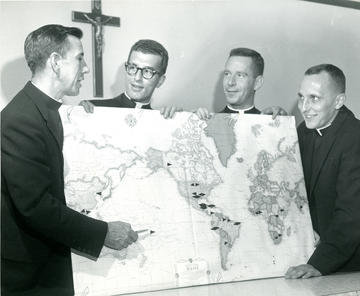Latin America and the Global History of Catholicism

Father James Duffy, Director of the Papal Volunteers for Latin America of the Archdiocese of Milwaukee, points to a map depicting Milwaukee missionaries, October 6, 1962. Photo courtesy of the Archdiocese of Milwaukee Archives.
Latin America and the Global History of Catholicism consists of several interlinked projects being undertaken by Dr Daniel McDonald as part of his postdoctoral fellowship and as a member of the “Global Pontificate of Pius XII: Catholicism in a Divided World” research network funded by the Max Weber Foundation. In addition to the Pius XII research network, these projects have received support from a British Academy/Leverhulme Small Research Grant and the OUP Fell Fund as well as the Faculty of History and Latin American Centre here at Oxford. For the overall project site of Pius see the project site for “Global Pontificate of Pius XII” network here: https://piusxii.hypotheses.org/.
Latin America and the United States in Catholicism’s Global Cold War
This project examines the global Catholic mobilization around Latin America during the Cold War through the relationship between the region and the Catholic Church in the United States. In the post-WWII period, the Vatican under successive popes feared the spread of communism amid a chronic priest shortage in Latin America and so called for North American and European churches to send clergy, lay volunteers, and funds while encouraging the creation of a global web of institutions towards these ends. Linking the global and the local, the project explores how inter-American exchanges, initiatives, and interactions remade global Catholicism and offer new understandings of the Cold War that go beyond traditional binaries that have traditionally shaped conceptions of the conflict. For this project, McDonald is conducting research in archives across three continents, including the newly released documents from the papacy of Pius XII (1939-1958) in the Vatican Secret Archives.
In November 2024, this project organized a conference “Catholicism and the Cold War in Latin America” at St Antony’s College that brought together historians from across Latin America, Europe, and the United States. This gathering served as the basis for an edited volume co-edited by Daniel McDonald (Oxford), Jaime Pensado (Notre Dame), and Simon Unger (GHI Rome) provisionally titled, Revolutions in Faith: Catholicism’s Cold War in Latin America. An active, ongoing project, additional collaborative publications and conferences are in process.
Brazil and the Making of Catholic Internationalism
Most of the literature on Catholic internationalism focuses on Europe and the spread of Catholic Action to other regions of the world during the twentieth century. This project inverts that focus, examining the making of Catholic internationalism from the perspective of the working-class Brazilians who joined its urban and rural workers’ wings, the Juventude Operária Católica (JOC) and the Juventude Agrária Católica (JAC), respectively. Across the 1950s and 1960s, the Brazilian JOC and JAC became among the most active and activist national branches of these transnational organizations, contributing to a more radical vision of Catholic internationalism amid the Cold War that influenced their counterparts across the Americas, Europe, and the rest of the Catholic world. In the process, Brazilian Catholic activists helped construct networks of solidarity that supported campaigns against authoritarian governments and human rights abuses in Latin America and beyond. Archival research for this project is ongoing at archives in Brazil, Europe, and the United States.
Peripheral Citizenship: Popular Movements and the Catholic Church in Urban Brazil
This project explores how popular movements and the Catholic Church navigated two transitions that remade twentieth-century Latin America: the region’s rapid shift from predominantly rural to urban and the rise and fall of Cold War military dictatorships. Using São Paulo as a case study, this project examines the rise of popular movements and the liberationist Catholic Church in the city’s urban peripheries during Brazil’s civil-military dictatorship (1964-1985) and the subsequent transition to democracy. Drawing on a collaborative digitization project and over fifty oral histories, Peripheral Citizenship goes within these movements and parishes to trace how they articulated alternative understandings of rights and democracy and contributed to the emergence of liberation theology across Brazil’s civil-military dictatorship (1964-1985) and the subsequent transition to democracy.
Peripheral Citizenship is currently under contract with the University of California Press. An article tracing the collaborative popular archiving and digitization project that formed part of the research for this manuscript appeared in the June 2024 issue of the American Historical Review. Likewise, this project led to the publication of the first peer-reviewed video essay in the history of the American Historical Review alongside a traditional written article that examined how popular movements constructed conceptions of space that facilitated resilience through hand-drawn illustrations on movement paraphernalia. Further articles related to this project on popular conceptions of the right to health and on popular participation in the writing of Brazil’s 1988 constitution were published in the Hispanic American Historical Review and The Americas, respectively.
At present, McDonald is co-editing with Felipe Loureiro (Universidade de São Paulo) a thematic issue of Latin American Perspectives “Revisiting the Brazilian Transition to Democracy” set to coincide with the 40th anniversary of the restoration of civilian rule in Brazil. Similarly, he is a member of the Núcleo de Apoio à Difusão de Informações sobre a Comissão Nacional de Verdade (NACE-CNV) based at the University of São Paulo.



